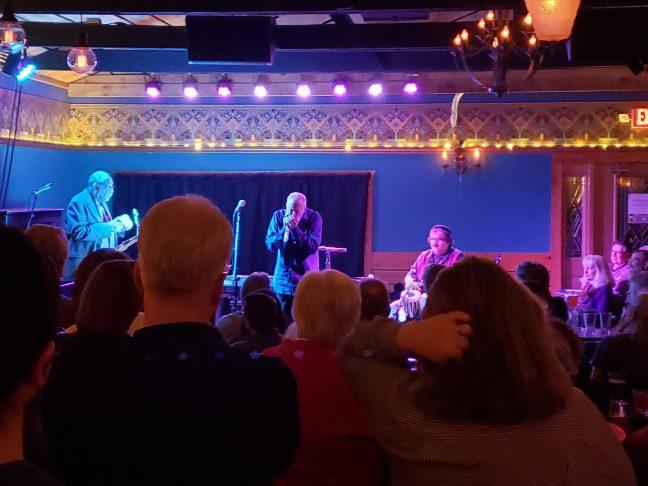The North Street Cabaret — a small, squat tavern — looked quiet and unassuming from the exterior, but stepping inside the venue on Saturday, February 22, was like stepping into another place and time entirely. Soft, amber lights gently illuminated the crowd with the ornate, classic wallpaper border ribboning the walls. Ernie Watts and Corky Siegel, joined by Kaylan Pathak, stood on the stage where they were bathed in blue and purple spotlights. Around them, people crowded in closely, all trying to get a glimpse of the performers in the packed venue.
“The biggest effect on a concert and how an audience responds is mostly the architecture,” Siegel said.
And the cozy venue certainly made me feel more engaged and enraptured by Siegel, Watts and Pathak’s highly skilled performances.
Pathak, an accomplished composer and percussionist, played the tabla, providing the rhythm which formed a strong backbone for the evening’s music. At one point during the night, he performed a solo on the tabla, voicing the rhythm he was about to play before recreating it on the tabla. His sense of timing was impeccable, and the variety of different sounds he was able to coax out of his instrument was impressive.
Siegel provided vocals, singing and introducing each song, as he played piano.
“As I call myself: a singer of unusual songs,” he said.
His real expertise, though, lies with the harmonica. Through his performance, he demonstrated a real mastery of the instrument as well as a passion for playing it.
“Your personality is part of the music, and your body is part of the music. You throw everything in there,” Siegel said.
Watching his performance, I suddenly felt I understood what he meant. Whenever he broke out the harmonica for a solo, it was as if the music had come over him, and he was a part of it as much as he was the source.
Watts’s performances were equally masterful, but for him, music and performance are all about the energy.
“When we get on the stage to perform, to create, there’s another kind of energy — the creative energy of music — that comes and goes through you … It’s like another world,” he said.
Both Siegel and Watts expressed a feeling of connection with their audience. For Watts, this came in the form of a spiritual interaction.
“It’s an energy exchange with us and with them,” Watts said.
For Siegel, it’s a responsibility to his audience.
“As musicians, we are offered an opportunity to work in a medium that, on its own, uplifts people, brings joy, brings people together, and brings good into the world. And we are the conduit to bring that to people,” Siegel said.
When the two of them played together, improvising interesting and exciting duets, the joy in the audience was palpable. During their performance of “Hey, Billie Jean,” Watts began their interplay hitting all the high notes on his sax while Siegel and his harmonica provided a lower harmony at the same time.
From his lower pitch, Siegel would leap up the range of his harmonica, as Watts simultaneously slid down, creating a dramatic exchange between the two instruments. Then, they moved into a rhythmic interplay in which they both played on the downbeat until Siegel slowly phased out to take the upbeats and drove their improvisation into a more dramatic final cadence.
Being masters of improvisation, they both shared some thoughts with me on the art of improv. Siegel and Watts share an appreciation of the freedom of expression it affords them.
“We know the tunes that we’re going to play, we know what direction we’re going to go in, but we don’t know all of the notes we’re going to play,” Watts said. “That’s when the freedom comes in. That’s when the expression comes in.”
Siegel agreed with his colleague.
“One of the things that allow the energy to flow is spontaneity. You want to make a lot of room for spontaneity,” Siegel said.
This philosophy was clearly reflected in their concert in the sheer amount of improvisation for which they made time. These complex exchanges were, of course, packed with emotion and expression.
“We are the development of everything we’ve come from … so we bring our whole history of all of our life experiences and our studies to our performance … we bring everything with us,” Watts said.
And Saturday night, they certainly brought everything with them. Watching them perform was like listening to them tell their life story and stepping back in time with them.


